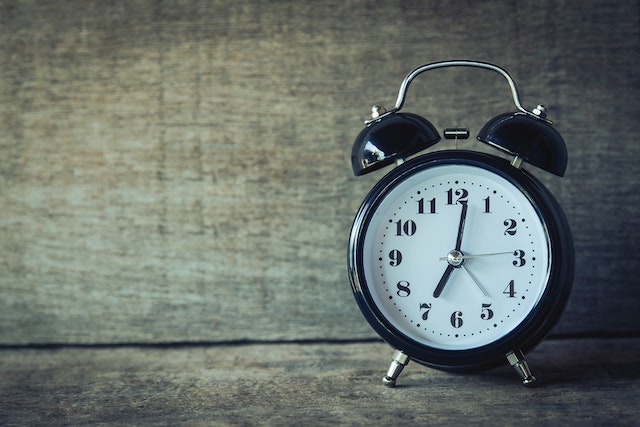
Why were alarm clocks the first consumer goods to stop being rationed during World War 2? Because, as you would expect, people couldn’t wake up in time to work.
People have used many different methods to wake themselves up over the centuries. Some people relied on church bells. Some people used elaborate systems with candles or pouring water. The candle method works by knowing how long the candle will take to burn. If you want to wake up in eight hours, you place a candle on a metal plate and stick nails in the candle at the point you think it will burn down to in eight hours time. When the candle burns down to that point, the nails will fall out and hit the metal plate, waking you up. Plato is said to have used a water clock with gongs attached. The water wheel turned cogs, which took a set amount of time to ring a gong.
However, being up for work at a specific time is a very modern concept. Only since factories and shift work was introduced during the Industrial Revolution have the majority of people needed to be up at an exact time. Before factories were introduced on a large scale, most people worked the land and farmers never had any need to know the time. Knowing if it was 6:40 or 6:50 made no difference to them. They woke up when the roosters crowed, fed the cows when they were hungry, harvested the wheat when it was ready, and went to sleep when it got dark. Needing to know what time it is at every point of the day only is a relatively recent thing.
Once factories were introduced and round the clock shifts were invented, people needed to be at their job on time. That meant waking up at a specific, often unnatural, time. You couldn’t rely on waking up naturally, so some people employed a knocker upper. This was a person who you would pay to bang on your windows with a big stick in the morning to wake you up. A lot of knocker-uppers were retired people, but some policemen actually supplemented their income by knocking people up. Surprisingly, the last knocker-upper retired in the UK in 1970.
The first mechanical alarm clock was invented in Germany in the 15th century, but clocks were not very reliable until Christiann Huygens invented an accurate pendulum clock in 1656. An inventor called Levi Hutchins invented an alarm clock in 1787, but it only sounded at 4am and he never patented the idea. It was only in 1847 that Antoine Redier came up with an adjustable alarm clock. They were mass-produced in many countries and as they became more accurate and cheaper, they gained popularity. By the start of the Second World War, most people used alarm clocks to wake themselves up.
So, why were alarm clocks the first consumer goods to stop being rationed during World War 2? When war broke out, all factories that were turning out consumer goods were told to start making things for the war effort. So, an alarm clock factory would begin making dials and controls for a plane, for example. At the time, clocks had wooden frames and brass workings. All of those materials became vital for the war effort and alarm clock production was stopped. However, people still needed alarm clocks, so a variety made of pulped paper were brought into the market. They were not very reliable or popular.
It became impossible to buy new alarm clocks and old broken alarm clocks couldn’t be. More and more people began to miss their shifts at work and the American government realized that something needed to be done. They ordered Westclox, an alarm clock company, to start producing alarm clocks again in 1943. They had to use more wood and less metal, but they managed to do it. Before the war, they used 136 kg of brass for every 1000 alarm clocks, but when they restarted production they were limited to 3 kg for every 1000 clocks. Westclox went into mass-production by 1944 and cornered the market for several years after the war.
So, why were alarm clocks the first consumer goods to stop being rationed during World War 2? Because without them people just couldn’t wake up and that began to negatively affect the war effort. And this is what I learned today.
Sources
https://www.atlasobscura.com/articles/a-2000year-history-of-alarm-clocks
https://en.wikipedia.org/wiki/Knocker-up
https://www.bibalex.org/SCIplanet/en/Article/Details?id=12370
